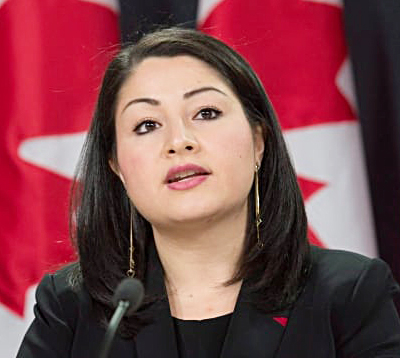Canada
ADB hails Canada’s US$1.1B pledge

By William Doyle-Marshall
Canada recently announced a $1.1 billion commitment in temporary callable capital to support the African Development Bank (ADB). Maryam Monsef, the Canadian Minister of International Development and for Women and Gender Equality told members of the World Bank Canada is demonstrating its commitment to African countries and its confidence in the ADB by announcing that it is going to subscribe up to US$1.1B in temporary callable capital, if required.
The Minister made the announcement to members of the Diplomatic Corps based in Washington D.C., governors of the ADB, executive directors, including executive director David Stevenson who represents Canada, China, Korea, Turkey and Kuwait. The Bank’s senior management team was also in attendance.
The announcement followed a meeting of the Bank’s governors in Washington D.C. to continue discussions on a 7th General Capital Increase. “The African Development Bank is a key partner for Canada and we are committed to supporting the Bank’s African member countries. Canada and Canadians are proud of our long history of partnership and collaboration with Africa,” Monsef noted.
The Minister reminded the 100 attendees that Canada was determined to ensure that “no less than 50% of bilateral development assistance is dedicated to sub-Saharan Africa by 2021-2022.”
The Bank’s President, Dr Akinwumi A. Adesina said Canada’s commitment and support is a huge boost to the Bank. “It will allow the Bank to strengthen its Triple-A rating and increase lending to member countries while discussions are ongoing among all shareholders for a general capital Increase,” he said.
“Your announcement is a clear indication that Canada has strong confidence in the African Development Bank,” Adesina added, while extending the Bank’s appreciation to Prime Minister Justin Trudeau for Canada’s unwavering support.
Canada has been a member of the ADB since Jan 1983 and has participated in all general capital increases of the Bank. It provided temporary callable capital in 2010 while the GCI VI negotiations were ongoing. That decision enabled the Bank to continue to provide support to regional member countries in the aftermath of the international financial crisis.
Minister Monsef urged other AAA-rated member countries to join Canada in providing temporary callable capital to the Bank. “I sincerely hope that this announcement will facilitate the general capital Increase negotiations and help support your efforts. Canada stands with you.”
In welcoming the media to the IMF and World Bank Spring meetings David Malpass, president, admitted that the institution plays an increasingly important role in leading on global challenges that people face in developing countries. “Our mission is clear and important. The bank’s role is particularly important in poor countries where the global economic slowdown that began last year hits people the hardest.
“Global growth lost momentum throughout 2018 falling to 2.7 percent in the fourth quarter down from 3.3% in the first quarter based on World Bank calculations,” Malpass disclosed. The deceleration was seen in both advanced and developing economies and it coincided with three other warning signs: weighing structural reforms in major economies; financial stress in some large emerging markets and elevated policy uncertainty globally. Current trends, per capita income in growth in sub-Saharan Africa as a whole is now projected to stay below one percent until at least 2021 which elevates the risk of a further concentration of extreme poverty on the continent, the Group President disclosed.
“Growth in median income will also be weak. This fact is extremely troubling because it jeopardizes the World Bank’s primary goal of ending extreme poverty by 2030. Globally extreme poverty has dropped to 700 million at the last count. That’s down from much higher levels in the 1990s and 2000s but the number of people living in extreme poverty is on the rise in sub-Saharan Africa,” Malpass said.